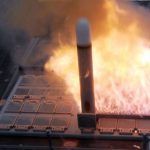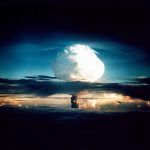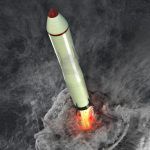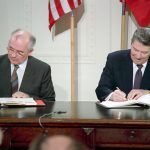A mix of impatience and uncreativity
By Sharon Squassoni | October 24, 2018

One of the most important and historic arms control treaties between the United States and Russia—the 1987 Intermediate-range Nuclear Forces Treaty (INF)—is about to go belly-up not because Russia has cheated, but because patience and creativity have run their course in the Trump administration. That should surprise no one, since those two characteristics have never been hallmarks of the Trump White House. The announcement, coming from Donald Trump himself at a political rally, is completely consistent with Trump’s allergy to treaties, his crude calculation of American costs and benefits, and his unshakeable belief that more is better than less of anything. While Tennessee Sen. Bob Corker may be bravely trying to spin Trump’s rash action as a clever strategy to bring Russia into compliance with the treaty, Trump’s bargaining strategy vis-à-vis the Russians is anything but transparent. The witches’ brew of Trumpian volatility—an impetus to “do something,” particularly before an election, to prove he is tough with the Russians—combined with senior officials who actively oppose international law is potent indeed.
Without understanding that John Bolton, the president’s national security adviser, is actively opposed to restraints on US freedom of action, arms control experts could be forgiven for wishfully thinking that the INF Treaty would fly below the radar of Trump’s interest, or that Ronald Reagan’s signature lent immunity to the agreement. Staying in the treaty while working to tie Russia’s hands would have been a reasonable approach for a few more years, if the treaty had been perceived as having value.
If all treaties are bad, however, it may make sense to spend billions of dollars to achieve less security for Europe in the treaty’s absence. Added benefits of the Trump approach include jobs for American workers and profits for American defense contractors, since new ground-launched US cruise missiles most assuredly won’t be outsourced. And America can make lots of them, to deploy in Europe and Asia. Maybe Saudi Arabia would even be interested in militarizing the Middle East a little further?
Of course, there is no guarantee that our allies will be willing to station new US nuclear weapons on their soil. In Asia, South Korean President Moon might be unwilling to stage nuclear cruise missiles in his country, sacrificing his new relationship with Kim Jong-un, and it’s possible that President Trump might feel the same way. And while Japan’s Prime Minister Abe is hawkish, it would be quite a leap for him to openly abrogate Japan’s policy, dating back to 1967, that it will not possess, produce, or allow nuclear weapons on its territory. (We know now from declassified documents that Japan secretly gave its consent for the United States to station nuclear weapons in Okinawa decades ago, but such secrecy is no longer tenable in the age of social media.)
European reactions will depend partly on how Russia responds, how attitudes about nuclear weapons have evolved in individual countries, and on assessments of just how trustworthy the United States is. Since the timeline for deploying new land-based nuclear-armed cruise missiles is way beyond a first or even second Trump presidency, US-European relations could be much better then than they are now. But the decision to deploy would come sooner and incur political costs for both individual countries and European unity. If we are lucky, Trump’s bold plan to abrogate the INF treaty may go the way of many of his other bold plans—and quietly recede into the background noise of a chaotic Pennsylvania Avenue.
Together, we make the world safer.
The Bulletin elevates expert voices above the noise. But as an independent nonprofit organization, our operations depend on the support of readers like you. Help us continue to deliver quality journalism that holds leaders accountable. Your support of our work at any level is important. In return, we promise our coverage will be understandable, influential, vigilant, solution-oriented, and fair-minded. Together we can make a difference.
Share: [addthis tool="addthis_inline_share_toolbox"]















Increasing the probability that the US homeland will be utterly destroyed by massed Russian nuclear strikes shows that the Trump White House is either suicidal or really is as stupid as everyone says.